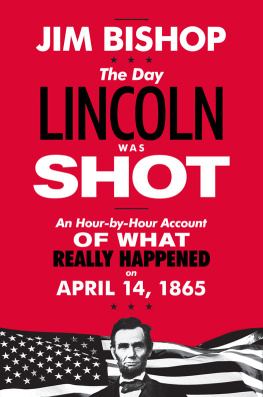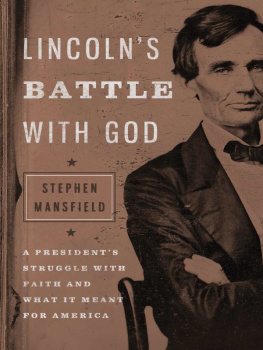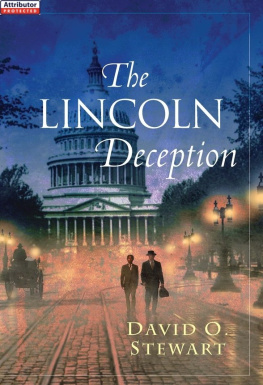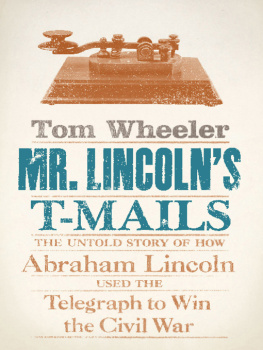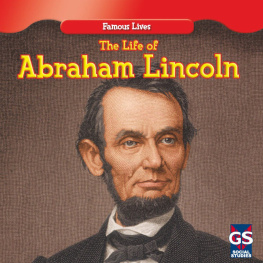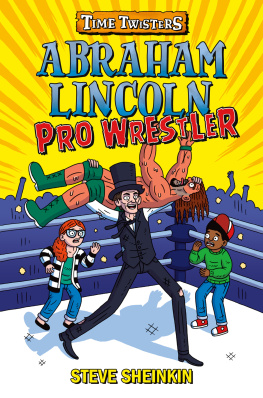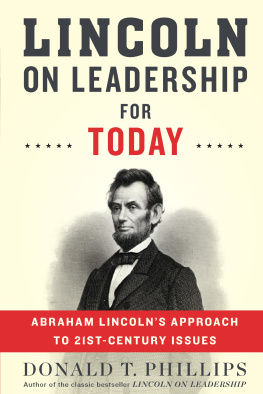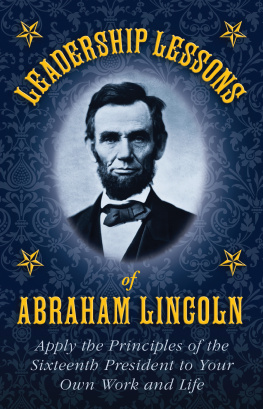
A BRAHAM L INCOLN
Lessons in Spiritual Leadership
E LTON T RUEBLOOD

CONTENTS
P rofessor Elton Truebloods study of Abraham Lincolns evolving understanding of religion originally appeared shortly before many Americans became publicly interested in their presidents religious beliefs. Their curiosityat times, it has seemed obsessivebegan with Jimmy Carter, who spoke openly about his evangelical Protestantism. It has continued unabated, even when the individuals on whom it has focused appeared reticent to speak about this dimension of their lives. The news media, standing in for the public, have found it natural to inquire about candidates religious beliefs. From Ronald Reagan to Barack Obama, presidents have found their statements on personal faith carefully scrutinized.
The trend emerged in Americans reactions to the cultural convulsions between John F. Kennedys assassination and Richard Nixons resignation. Personal religiosity came increasingly to be understood to stand in for moral characterand not for the first time. Washington, in his Farewell Address, stated that the virtue required for self-government was founded on religion and morality. Two centuries later, many of his countrymen seem perfectly willing to believe the same.
Truebloods study of Lincoln is, fortunately, of a different quality altogether, and far more interesting for it. His interest is not in Lincolns religionwhatever that may have beenbut in Lincolns thinking about religion (italics his), a richer and more dynamic field. Truebloods reading of Lincoln convinced him that the man who wrote the Second Inaugural Address was not the same intellectually as the one elected president in 1860. He had undergone a searing transformationthe fiery trial, in a phrase Lincoln used. This experiential deepening opened Lincoln to a new understanding of how God works in the world. Nothing about that personal journey or the place to which it took Lincoln offered him the comfort of religious assurance as many would understand the term. But it gave him a solid moral foundation from which to conduct himself as president and, importantly, to explain the Civil War to Americans.
I cannot but note that Trueblood attributed, in part, his interest in Lincoln as theologian to the influence of my great-uncle, Reinhold Niebuhr. The latter, who recognized the singular danger of human prideespecially when expressed through the nation-statedeeply admired Lincoln for his humility and for the fact that his humility did not inhibit his ability to act.
Lincolns process of thinking about religion is nowhere more in evidence than in the statement he wrote, apparently for himself, in the late summer or early autumn of 1862. His secretary, who discovered it later, gave it a titleMeditation on the Divine Will. Themes of the Second Inaugural Address are easily discerned in the short document, most so in Lincolns concluding that the war was a product of Gods will and it would continue until God brought it to a close. What makes the document so revelatory of the theological insight to which Lincoln was coming is the agonizing sense of discovery with which it speaks. Lincoln reached a depth of conviction that would stay with him until his death.
Trueblood also points us toward a basis of Lincolns intellectual maturation when he discusses the texts that formed the early education of a president who lacked almost any formal schooling. Yes, Lincoln was Biblically literate as few are today. But from his youth onward, he supplemented a study of Scripture with close readings of Shakespeare, particularly the tragedies. As president, he could recite from them at lengthas indeed he did from King John in May 1862, as he spoke through tears about the terrible loss of his favorite son, Willie, who died of an illness weeks earlier.
Lincoln had an understanding of tragedy in its largest sensethat humans must and will act, but the effect of their actions cannot equal their hopes and may even be destructive of them. A greater forcethe God that Lincoln discernedwould alone resolve human events. The Almighty has His own purposes, Lincoln told the crowd that came to hear him at his second inauguration. That might mean the destruction of all of Americas wealth so cruelly reaped through slave labor. But, if it did, that would be a function of Gods judgment, Lincoln said, a force as true and righteous in 1865 as the Biblical Hebrews understood it to have been three millennia before.
Almost no religious figure, North or South, could locate such moral ground and dare describe it so publicly. Both sections were full of men and women who believed and proclaimed God to be firmly on their sidean easy and shallow assertion that reduced God to a sort of house deity. Lincoln was not the man to call that heresy, but he recognized that the two sides prayed to and begged aid from the same divine source. The prayers of both could not be answered; that of neither has been answered fully, Lincoln said, again in the Second Inaugural Address.
Such a magisterial assessment of the moral dilemma of an almost-chosen people is what makes Lincoln unique as a national leader. It is why we are drawn back again and again to his writings. One cannot imagine him passing out of date. Nor do his works ever become truly familiar. The language he usedand the thinking that guided his choice of wordsmakes every reading seem like a discovery.
In discussing Lincoln as an American theologian, Trueblood allows us to encounter the man anew as he progressed toward his role as national leader at a time when this nation, under God, shall have a new birth of freedom. The phrase, from the Gettysburg Address, describes his emerging understanding of the divine will. Trueblood serves as a worthy guide in returning us to the unparalleled drama of Lincoln within our nations most important struggle.
Gustav Niebuhr
Skaneateles, New York
September 2012
H ints dropped long ago by two Christian thinkers started me on the road to the eventual production of this book. One was my teacher, the other my friend, and now both are gone from us. The former was Willard L. Sperry, who was Dean of Harvard Divinity School in my time there, while the latter was Professor Reinhold Niebuhr, of Union Theological Seminary, New York. Both dealt, in conversation as well as in print, with Abraham Lincolns theological acumen. Dean Sperry referred often to Lincoln as a theologian, saying, He is one of the few men in history, our own history and all history, whose religion was great enough to bridge the gulfs between the sects, and to encompass us all. Reinhold Niebuhr rated the Civil War President as the most original of American religious thinkers. Lincoln, he said, has always been my hero in religion and statecraft. Both of these scholars were convinced that professional theologians could learn much from a man who, while making no claim to theological competence, demonstrated genuine profundity concerning humans and their relationship to God.
What I found difficult to resist, and what I did not really desire to resist, was the attraction of undoubted greatness. I noted Lord Tweedsmuirs pithy remark, in justification of his producing a biography of Oliver Cromwell, when others already existed. Every student of the seventeenth century in England, he said, must desire sooner or later to have his say about its greatest figure. The same holds true for everyone who cares about the American experiment. We know who the greatest figure is and we cannot leave him alone. If the contemporary student can add anything to the understanding of the deeper springs of Lincolns character, no further justification is required.
Next page

